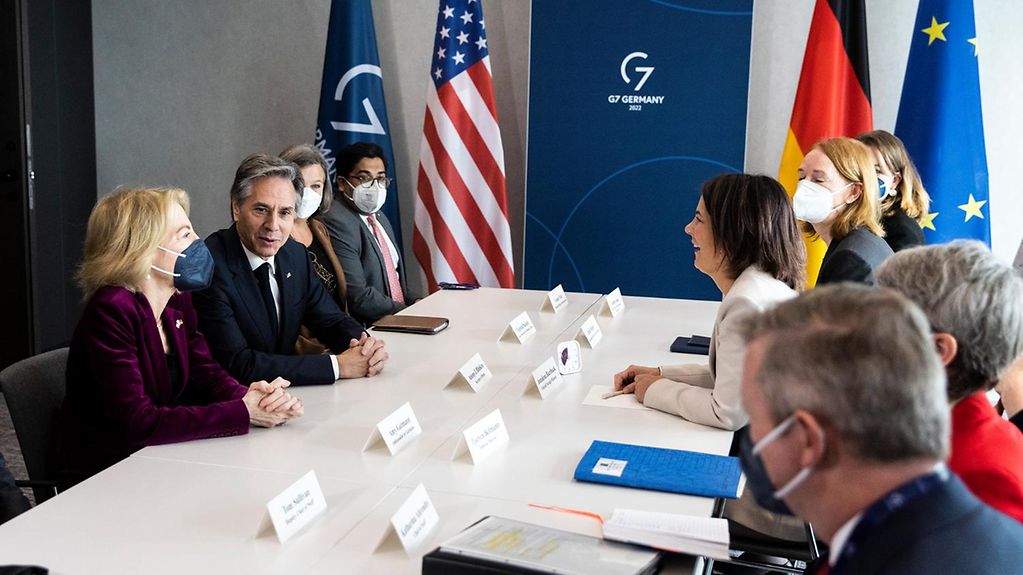Meeting of the G7 Foreign Ministers
Current geopolitical challenges and especially the war in Ukraine were the key issues discussed at the meeting of the G7 Foreign Ministers. Foreign Minister Baerbock invited her counterparts to a historic site in Münster in Westphalia.
3 min reading time

In addition to the Russian war of aggression against Ukraine, other current geopolitical challenges were discussed at the meeting of the G7 Foreign Ministers.
Photo: Leon Kuegeler/photothek.de
The G7 sent yet another signal of unity from Münster. “In the time of Russia’s brutal war of aggression not only against Ukraine but against the international order, it is all the more important to show that we all represent global peace and in particular the power of international law,” said Foreign Minister Annalena Baerbock at the start of the two-day G7 meeting with her counterparts.
Joint winter aid
“We have been seeing since 24 February how the Russian president has not only been brutally attacking Ukraine and its people, but also how he has massively expanded his war in recent months, and has been violating international law and the global order by using hunger and disinformation as weapons,” Baerbock stressed.
By attacking civil infrastructure, the Russian president had chosen a new method of warfare, the minister said, adding that in the cities and regions that cannot be conquered by military means, he was trying to make people die of hunger, thirst and the cold. She went on: “We as the G7 partners will try and prevent this with all means available.”
Baerbock emphasised the unity of the G7: as had been the case with regard to sanctions against Russia, help for refugees, humanitarian aid for Ukraine and the delivery of weapons for the Ukrainian forces, the G7 states would now also arrange for winter aid for the Ukrainian population. “We agreed 254 days ago and we still do now – without any limitations or reservations: if democracy itself is under attack, then we must and we will use our full weight as the economically strongest democracies to push back,” said Baerbock after the end of the G7 Foreign Ministers’ meeting.
The joint G7 declaration of the Foreign Ministers is available on the website of the Federal Foreign Office.
Meeting at a historic site
“Peace through justice – this is the motto Münster has stood for ever since the Peace of Westphalia. Peace through justice – this is also what the G7 stand for,” said Foreign Minister Baerbock in Münster, where the Peace of Westphalia was established 375 years ago. “The Peace of Westphalia was one of the defining events from which modern international law originated. Fundamental concepts, such as the equality and sovereignty of the individual states, were negotiated here for the first time in a major peace treaty. We must protect this legacy,” the Foreign Minister stressed, explaining that this was why she had chosen this symbolic location as a conference venue in these testing times. “It was a deliberate decision to invite the G7 to Münster rather than to Berlin. The atmosphere is different if you gather in a plain conference room than is the case at a historic venue such as the Hall of Peace,” the Foreign Minister pointed out.
In addition to the Russian war of aggression against Ukraine, other current geopolitical challenges were discussed at the meeting of the G7 Foreign Ministers. They spoke, for example, about how to deal with China in a manner that is in keeping with the times, about the Indo-Pacific region, the situation of people in Iran and about possible formats for cooperation with Central Asia.
The conference in Münster was the tenth meeting of the Foreign Ministers during the German G7 Presidency.